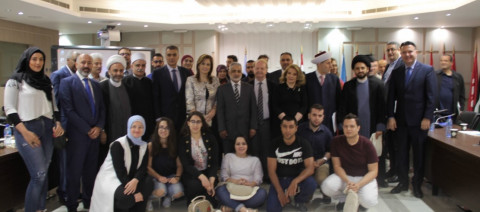
GCED Basic Search Form
Quick Search
You are here
News

Within the framework of UNESCO’s efforts to spread the culture of peace and dialogue, and in its efforts to achieve SDG4.7 which calls for the promotion of a culture of peace and global citizenship, UNESCO Beirut hosted on 20 June 2019 a high-level panel on “The culture of dialogue and tolerance among youth: the role of religious institutions, the media, and universities”.
Held under the patronage of the guest of honor H.E. Layla el Solh Hamadeh, and in partnership with the Lebanese National Commission for UNESCO (LNCU), and the Agence Universitaire de la Francophonie (AUF), the panel was moderated Mr Ghassan Hajjar, and featured distinguished guests: Mufti Malek al-Shaar, Sayyed Jaafar Fadlallah, Monseigneur Michel Aoun, Mrs Laure Sleiman, and Dr Selim el-Sayegh. The event was attended by renowned figures representing religious institutions, universities, media, civil society, and youth.
In his welcome note, Dr Hegazi Idriss, UNESCO Beirut’s Programme Specialist for Basic Education & Literacy, highlighted that the high-level panel comes as part of a series of actions and initiatives taken by UNESCO to spread the culture of dialogue and peace in Lebanon and in the region. Idriss mentioned that the youth are an important target and beneficiary of UNESCO programmes as they are agents for positive change in societies, and an important actor in the advancement of the sustainable development goals.
Speaking at the opening of the panel, UNESCO Beirut’s director Dr Hamed al Hamami, reiterated UNESCO’s commitment to spread a culture of peace, tolerance, and mutual understanding, especially in the Arab region. Al Hamami said: “Our region is experiencing bitter conflicts, the prevalence of intolerance and violence. Innocent lives have been lost because of extremism and hatred, but hope remains as we witness various positive efforts and initiatives that aim at promoting dialogue and tolerance, thus planting the seeds for peace”.
He added: “It is the values of tolerance, mutual understanding, and respect of others that guide our work at UNESCO. UNESCO’s Constitution reads: ‘Since wars begin in the minds of men, it is in the minds of men that the defences of peace must be constructed’. This motto is particularly relevant for our region today, where we shall rethink it and act upon it”. Al Hamami concluded by thanking the guest of honor, Mrs El Solh, for her constant support of UNESCO Beirut.
In her speech, the Secretary-General of LNCU, Dr Tala Zein, highlighted the role the LNCU plays in disseminating a culture of peace in Lebanon, especially among the youth. Zein said: “In its activities, LNCU devotes a particular attention for youth. We cooperate with a large array of local, regional, and international partners, be they NGOs, experts, educators, intellectuals, and media professionals, to address the youth through targeted actions and initiatives that aim at strengthening their feelings of belonging, promoting their active social engagement, and consolidating in their minds the values of tolerance, dialogue, respect for diversity, and mutual understanding”.
In his turn, Mr Herve Sabourin, regional director of AUF-Moyen Orient, highlighted the importance of this activity for his organization: “This high-level panel is part of a series of initiatives that we and our partner have been taking in recent years to address issues that are highly relevant for our world and region today. Indeed, themes such as intercultural or interreligious dialogue, tolerance and conflict resolution, mediation and education on non-violence and peace, challenge each and every one of us and also challenge the institutions we represent. In the troubled world in which we live, where so many peoples are paying the price of blind intolerance and extremism, to evoke these themes and especially to designate them as major issues in our societies is more than a necessity, it is also a duty".
As to the guest of honor, H.E. Mrs El-Solh, she reiterated in her speech the Al Waleed Bin Talal Foundation’s commitment to assist any human being, irrespective of his/her race, gender, and religion, and to spread the culture of peace in the region. Mrs El-Solh highlighted that people are one in their humanity, hence the necessity and the moral duty to respect one another in our diversity.
Mrs El Solh thanked UNESCO Beirut for its efforts to improve education in the Arab world, and offered UNESCO Beirut’s director, Dr Hamed Al Hamami, the Al Waleed Bin Talal Foundation’s Appreciation Award.
The panelists emphasized the role of academia, the media, and religious institutions in highlighting the common values of humanity and uniting people in the region despite their diversity. The discussion focused on the necessity for religious leaders and media figures not to fall into the trap of sectarian or political strife, and to develop an official discourse that brings people together rather than setting them apart.
In parallel to the high-level panel, UNESCO Beirut, in partnership with the Professional Center for Mediation (CPM) at the University of Saint-Joseph, organized a one-day training for youth on “Mediation and Conflict-Resolution Skills”. Targeting 25 young students aged 18-25 from 8 universities in Lebanon, the training introduced participants to the concept of mediation, and equipped them with key skills to engage in such process. The training covered various topics, including: rumors and prejudices as source of conflict, active listening, positive communication, difference between facilitation and mediation, and the phases of a mediation process.
URL:
https://en.unesco.org/news/culture-dialogue-tolerance-among-youth-high-level-panel
